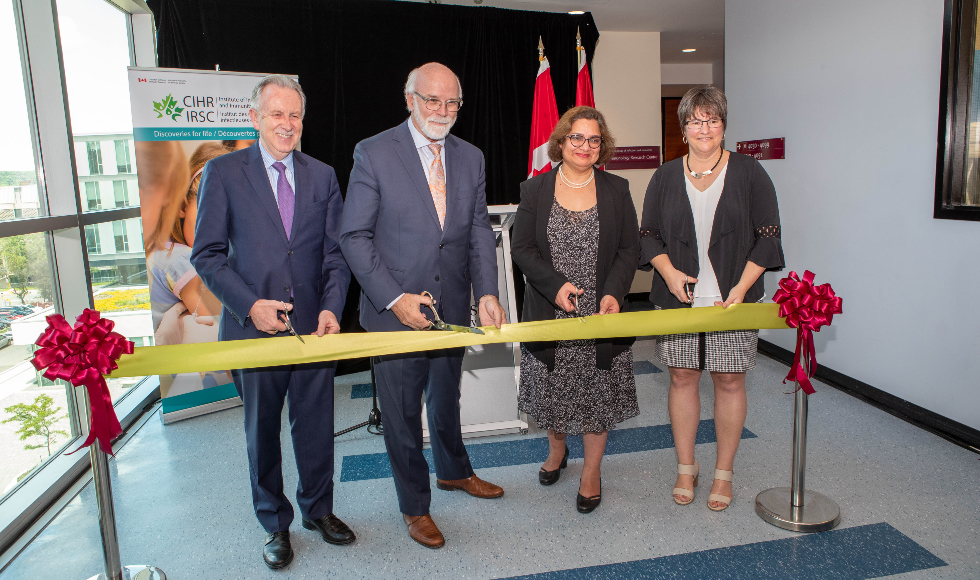Doors of new institute open at McMaster

The ribbon opening the CIHR Institute of Infection and Immunity (CIHR III) at McMaster University is cut on Friday, June 21. From left, Paul O’Byrne, dean and vice-president, Faculty of Health Sciences; Michael Strong, president, Canadian Institutes of Health Research; Charu Kaushic, scientific director, CIHR III, and Karen Mossman, acting vice-president, research, McMaster University.
June 21, 2019
The offices of an institute dedicated to broadening Canada’s research capacity in infectious disease and the response of the human immune system, opened today at McMaster University.
The Canadian Institutes of Health Research (CIHR) Institute of Infection and Immunity (CIHR III) is McMaster’s first institute sponsored by the federal health research funding agency.
CIHR President Michael Strong was on campus for the official inauguration and ribbon cutting for the new offices on the fourth floor of the Michael G. DeGroote Centre for Learning and Discovery.
“The Institutes are the life blood of CIHR’s strategic initiatives,” he said. “To host one is a tremendous contribution to the vitality of Canadian health research; CIHR is very appreciative to McMaster University for their support of this Institute and for ensuring the success of Dr. Kaushic.”
Charu Kaushic is the scientific director of the CIHR Institute of Infection and Immunity and a professor of pathology and molecular medicine at McMaster University.
As director of the CIHR III, she is focused on investing funding in strategic areas which promote novel and innovative research, enhance health and reduce global burden of infection and immune-based diseases. The institute supports programs which lead to international leadership and recognition of Canadian researchers.
“The CIHR Institute of Infection and Immunity is committed to our strategic priority of strengthening and coordinating excellent research in the areas of infection and immunity, and ensuring that the research has an impact in improving health of Canadians,” said Kaushic.
“We are also working hard to ensure that we are nurturing and supporting the next generation of Canadian health researchers within our mandate.”
Karen Mossman, acting vice-president, research for McMaster, said it’s fitting that the Institute makes its home at McMaster.
“We’ve amassed significant strength in the area of infectious disease and immunity research and identified it as a strategic priority. Charu’s track record of excellence and leadership at CIHR III will help strengthen Canada’s position as a global leader in this field.”
Paul O’Byrne, dean and vice-president, Faculty of Health Sciences, added: “The threat of potential disaster from infectious disease is real for Canada and the world. We are proud and very supportive of having this CIHR institute here at McMaster, and of the leadership Charu Kaushic will provide in co-ordinating the national research needed to be proactive in these critical health issues.”
The CIHR III office has six staff, and oversees national research worth $35 million a year. It is involved in national priority-driven research initiatives including, among others, antimicrobial resistance, Lyme disease, hepatitis C, HIV/AIDS and sepsis, as well as pandemic preparedness, inflammation in chronic disease and personalized medicine and pathways to health equity for Indigenous peoples.


